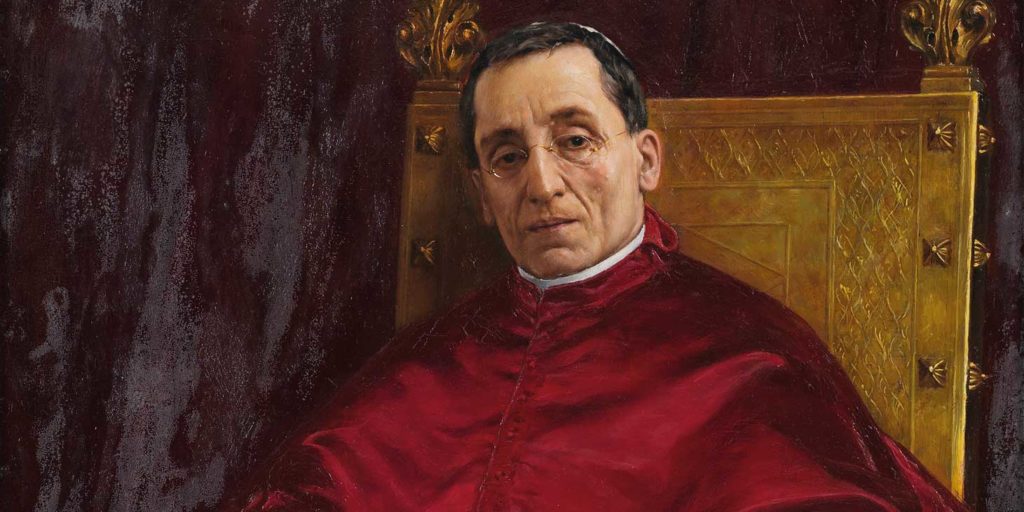We are commemorating, in this period of time from 2014 to 2018, the centenary of World War I, called at the time the Great War or European War, a name that later seemed inappropriate as nations from other continents, such as the United States and many Asian and Latin American countries, entered the conflict. That tragic conflict was unleashed -almost unexpectedly- by the coincidence of a series of factors of various kinds, which were triggered in the context of that historical moment. But what was the geopolitical and strategic structure of Europe?
Balance system
In 1914, the security of Europe rested on a fragile network of defensive alliances, drawn up by the German Chancellor. Otto von Bismarck. It was the so-called "armed peace", the result of the hegemony of the German Empire, which emerged after the defeat of France in the Franco-Prussian war of 1870. On the geopolitical map of the continent, two antagonistic blocs were emerging: the Triple Entente, formed by France, England and Russia; and the Triple Alliance, or the Triple Alliance, or Triplet, which linked the Central Empires, Germany and Austria-Hungary, and Italy. This system of balances was only a guarantee of a precarious peace, since it required continuous rearmament in order to be prepared for a war that was considered possible at any moment.
However, this sense of pre-war mistrust, nurtured by nationalist sectors and by the general staffs of the great powers, did not manage to tarnish the yearning for peace and the enjoyment of material progress that characterized those years of the late 19th and early 20th centuries, known as the "war of the nineteenth century". "belle époque". People lived in the "unconsciousness" of reality, for Europe was undergoing a socio-political transformation with industrialization, the workers' movement and nationalism. Proof of this majority mood is the comment made a few months before the outbreak of the conflict by the French ambassador in Berlin, Jules Cambon: "The majority of the French and Germans wish to live in peace, but in both countries there is a minority who dream only of battles, conquests and revenge. Therein lies the danger, beside which we must live as beside a powder keg, which may explode at the slightest imprudence.".
And the spark went off on June 28, 1914, in Sarajevo, capital of Bosnia-Herzegovina, where the heir to the Austro-Hungarian Empire, Archduke Franz Ferdinand, was assassinated together with his wife by a Slav terrorist. The government in Vienna blamed Serbia - a Slavic and Orthodox nation - for having planned this attack to hurt the Germanic and Catholic Habsburg Empire, and declared war on July 28.
Although it was initially thought that the hostilities would be of a limited nature, the fact is that the existing system of alliances was put into operation: Berlin had to support Vienna, while Russia, protector of Orthodoxy and Slavism, went to war against the Central Empires. In Western Europe, Germany's declaration of war on France was not long in coming. On the other hand, the invasion of Belgium by the German army, violating the neutrality of that country, provoked the immediate response of London. Thus, before the end of the month of August, the powers of the Triple Entente (France, England and Russia) had gone to war against Germany and Austria-Hungary, later joined by the Ottoman Empire, secular adversary of the Russians. Only Italy, despite being a member of the TripletThe company remained neutral for the time being, which did not go down well in Vienna and Berlin.
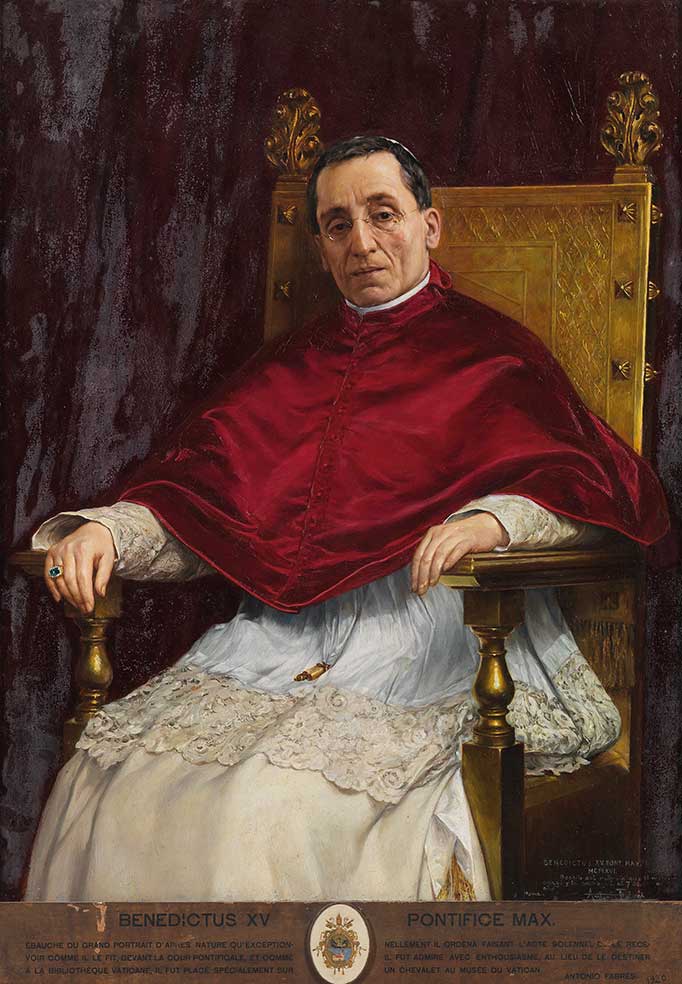
Pius X ... and Benedict XV
How did the Holy See react to this upheaval? St. Pius X had followed with concern and pain the chain of events that led to the outbreak of the conflict. "I bless peace, not war."he exclaimed when the Emperor of Austria begged him to bless his armies. It filled him with bitterness to see Catholic nations facing each other to the death. His health had been declining in step with these events. Overwhelmed by the tragic consequences he foresaw, he died on August 21.
On September 3, Cardinal Giacomo della Chiesa, Archbishop of Bologna, was elected his successor and took the name Benedict XV. The new Pope was a Genoese who had learned diplomacy from Cardinal Rampolla, the great Secretary of State of Leo XIII. Giacomo della Chiesa, solidly formed in the civil and ecclesiastical university classrooms, had accompanied Rampolla when the latter was nuncio in Madrid, between 1885 and 1887. During his stay in Madrid, he had the opportunity to work in the arbitration that Spain and Germany requested from Leo XIII to settle the dispute over the ownership of the Caroline Islands. Later, he held important positions in the Roman Curia before being appointed archbishop of Bologna. He was a seasoned diplomat and a good connoisseur of European politics.
Impartiality
Newly elected, Benedict XV urgently appealed for an immediate cessation of hostilities and expressed his rejection of the "freak show" of a fratricidal war, which caused a part of Europe to be in the grip of a "watered by Christian blood". And already from that moment, he established the position of the Holy See: impartiality.
In other words, the Holy See does not stand on the sidelines of the war tragedy as a neutral power, but considers itself morally involved because of the universal paternity of the Pope. But involved in a proper sense, in the measure, says the Pontiff, "in that...we have received from Jesus Christ, the Good Shepherd, the duty to embrace with fatherly love all the sheep and lambs of his flock." The cruelty of the struggle fueled nationalist passion: the French and Belgians were disappointed not to hear from the Pope an explicit condemnation of Germany for the invasion of Belgium or the bombing of the cathedral of Rheims. In fact, the Pope had publicly condemned "all violations of the law wherever committed".He was in close contact with Cardinal Mercier, Primate of Belgium, but this did not seem sufficient to those who wanted the Holy See to take sides. For its part, the imperial cabinet in Vienna was hurt at not having the Pope's explicit backing in the face of what it considered a Slavic conspiracy, protected by Russia and encouraged by France and England, to put an end to the Catholic empire of Austria-Hungary.
In his first encyclical, published in November 1914 under the title of Ad BeatissimiThe Pope analyzed the tragic European situation from the supernatural plane of the theology of history. His interpretation with eschatological overtones -he saw war as a divine punishment-, or his allusions to the "refined cruelty" of modern weaponry could not sound well in the ears of a nationalism exacerbated by a hatred that had been pent up for decades. Neither did their complaint at the sight of the Christian countries at loggerheads: "Who would say that those who thus fight each other have the same origin? Who would recognize them as brothers, children of the same Father, who is in heaven?". Nor does he hesitate to define as the main cause of this war the denial of the Christian meaning of life: forgetfulness of charity, contempt for authority, and the injustice of social struggles, delegitimized when violence is resorted to. And at the root of all this, the Pope stresses, is the greed for temporal goods generated by materialism. The Pope, it has been written, "saw in war the monstrous effect of the moral crisis of modern Europe."
Convinced that the most urgent objective was to stop the armed struggle, the Pontiff appealed to the responsibility of governments: "Let them hear us, we pray, those in whose hands are the destinies of the peoples. Other means exist, and other procedures for vindicating one's rights... Let them come to them, arms laid down for the time being.".
Intense humanitarian effort
As Christmas 1914 approached, the prospect of a long conflict was gaining momentum. The Pope then proposed a brief and definite lull in the fighting during the Christmas holidays. The idea, welcomed in principle by London, Berlin and Vienna, was rejected by Paris and St. Petersburg on various pretexts. Benedict XV expressed his sorrow at the Consistory of Cardinals, regretting that it had failed. "the hope we had conceived of comforting so many mothers and wives by the certainty that, for a few hours consecrated to the memory of the Divine Nativity, their loved ones would not fall under the enemy's lead.".
The diplomatic efforts of the Holy See ran parallel to an efficient and extensive humanitarian work. A team coordinated with the Red Cross operated in Rome and Switzerland under the orders of Monsignor Tedeschini, with the enormous task of providing information on the whereabouts of prisoners of war. By the end of the war, 600,000 requests for information and 40,000 requests for the repatriation of sick prisoners had been processed, and 50,000 letters of correspondence between prisoners and their families had been transmitted. The Pope also secured the release of prisoners who had been rendered unfit to fight, and transmitted to Emperor Wilhelm II numerous petitions for the commutation of death sentences against civilians handed down by German courts in occupied Belgium.
Likewise, the Holy See obtained, with the collaboration of the Swiss government, that 26,000 prisoners of war and 3,000 civilian detainees were allowed to convalesce in Swiss hospitals and sanatoriums. Benedict XV took special care to alleviate the suffering of children and to assist the civilian population of countries at war. Food aid operations organized by the Holy See took place without distinction of race, religion or side: Lithuania, Montenegro, Poland, Russian refugees, Syria and Lebanon received, among other nations and communities, papal protection.
The Pontiff was particularly concerned with the fate of the Armenians, whose persecution and extermination under Ottoman power induced him to intercede with the Sultan of Turkey. When the war was over, the Pope defended the national aspirations of the Armenians, and wrote to President Wilson to that effect. Benedict XV's efforts were recently recalled by Pope Francis, on the occasion of the centenary of what the current Pontiff has called the "centenary of the war". "first genocide of the 20th century". The gratitude of the peoples of the East is manifested in the bronze statue of Benedict XV that stands in front of the Catholic Cathedral of Istanbul. The monument was paid for by the religious communities of the Middle East (Muslims, Jews, Orthodox and Protestants).
Incomprehension
The Pope's diplomatic and humanitarian work was recognized without discussion on the international scene. German Chancellor von Bülow declared as much: "Benedict XV worked for peace with wisdom and firmness.".
However, Italy's entry into the war on the side of the Western Allies in May 1915 removed the hope that the war would be shortened. The situation of the Holy See was particularly delicate: the Pope lacked territorial sovereignty since the capture of Rome in 1870 and the loss of the Papal States. In spite of the ample guarantees received, at any moment he could be held hostage by a revolutionary Italian government. Faced with Italy's belligerence, Benedict XV adopted a policy of the utmost care to prevent the hierarchy and Italian Catholics from being carried away by nationalistic passions, thus compromising the impartiality of the Holy See. He did not hesitate to remind even some pastors of the Church that, above national interests, the interests of the Church and of humanity were paramount: "Lyricism, even patriotic lyricism, should not be seconded."and urged them to observe "a worthy reserve or a reserved membership"..
This prudent attitude was not understood either, because some sectors branded the Pontiff as defeatist, despite the fact that the Vatican cooperated with the Italian government to alleviate the terrible consequences of the fighting on the Italian-Austrian Isonzo front. The Pope, on the other hand, did not support conduct that failed to comply with the civic duties of national defense. Thus, he obliged seminarians to respect their military duties and did not allow the anticipation of priestly ordinations before the canonical age (25 years) to avoid conscription.
Impulses to peace
In July 1915, on the occasion of the first anniversary of the outbreak of war, Benedict XV addresses a solemn appeal to the belligerent peoples and their governments. The language and tone reflect his vision of a bloodied Europe: "In the most holy Name of God, by the precious Blood of Jesus... we conjure you, whom Divine Providence has placed in the government of the belligerent nations, to put an end to this horrible carnage which disgraces Europe.". And he bravely points out another aspect of war, the wealth of the contenders, which allows them to continue the fight with increasingly sophisticated weaponry: "But at what price! Let the thousands of young existences that are extinguished every day on the battlefields answer...". As a remedy to the futility of hatred and violence, Benedict XV proposes negotiating peace. "on reasonable terms" and states that "the equilibrium of the world, the tranquility... of nations rest on mutual benevolence and on respect for each other's rights and dignity...".
The exhortation was received with incomprehension by both sides, since neither wished to negotiate, knowing that this would imply giving in on demands and renouncing the crushing of the adversary. Benedict XV, in spite of everything, remained firm in working for peace. "no winners and no losers". The personal support he received from the new Austrian Emperor, Blessed Charles I, and his wife, Empress Zita of Bourbon-Parma, was of little use, since Germany had resolved to go all the way. Berlin's offers to examine a possible negotiation were of little credibility in the eyes of the Allies, since no concrete measures were specified, and the first condition "sine qua non" for London and Paris was the evacuation of Belgium.
At the beginning of 1917, the United States made the decision to enter the war with the Allies. This, together with the Russian revolution and the new submarine warfare launched by the German General Staff, made the Pope see that peace was still farther away. Nevertheless, some symptoms of "war fatigue" were perceptible and Benedict XV decided to take advantage of them. And for this purpose, aware that there was no time to lose, he entrusted Monsignor Eugenio Pacelli (the future Pius XII), nuncio in the kingdom of Bavaria, with the task of approaching Emperor Wilhelm and the government of Berlin.
A concrete proposal
Pacelli acted swiftly and persuasively, and secured the initial acquiescence of the German Chancellor, Bethmann-Hollweg, to essential points that included the limitation of armaments, the independence of Belgium and the settlement of disputes in international tribunals. Pacelli urged the Holy See to step forward with concrete proposals on which to negotiate. He also insisted on the need to prevent the military leadership in Berlin from convincing the emperor that the only solution was to carry the armed struggle to the end, still confident of victory.
The Pope was of the same opinion as Pacelli, and on August 1 he sent to the leaders of the belligerent nations a Note that included concrete points, such as disarmament, arbitration, freedom of navigation of the seas, restitution of occupied territories, which were basic to negotiate a just and lasting peace, as well as to stop definitively the "useless slaughter" Europe was suffering. Benedict XV advocates a new international order founded on moral principles. As Pollard states, "it was the first time in the course of the war that any person or power had formulated a practical and detailed outline for negotiating peace.".
A door slammed on the peaceful settlement
The reactions of the Allies were not very encouraging: from the rejection of France and Italy, to the British lukewarmness. However, the last word came from the American President, Wilson, who slammed the door definitively on the papal attempts to negotiate a peaceful settlement, without winners or losers, that would allow the cessation of the fighting and the restoration of the status quo The above as a preliminary step to an agreed solution to the differences.
Clearly, the Allies wanted no way out other than the defeat of Germany and the Habsburg Empire. On the part of Berlin and Vienna, the respective responses expressed sympathy for the initiative, but no commitment. In the end, the firm position of the German military high command prevailed, still confident of a victory over an exhausted western front. The Prussian generals did not want to realize that the intervention of the United States had tipped the balance inexorably. The Pope then saw clearly that his efforts had failed. It was then that he would confess that he had gone through one of the most bitter moments of his life. In any case, the Papal Note of 1917 influenced the negotiators of the Peace of Paris in 1919. There are obvious similarities between Benedict XV's proposals and the famous 14 Points that Wilson presented in Paris to inspire the construction of the new international order.
Failure?
Did the Papacy fail in its attempt to seek peace for Europe? It is true that Benedict was "the unheeded prophet", and that his appeals to the conscience of the powerful to stop what he called "a useless slaughter" were not only disregarded, but many described them as defeatist and impossible to obey. But despite the "seeds of discord" contained in the Peace Treaty (and which brought about World War II), which the Pope had warned the victors of 1919, the new international order was the fruit of a new vision of coexistence among peoples.
Indeed, it was recognized, for the first time, "the primacy of law over force".The new concept of modern diplomacy, according to the teaching of Benedict XV, whose voice was the only one to denounce from the beginning the evil of war and whose tireless work of charity did not distinguish between frontiers, creeds and nationalities. Blessed Paul VI alluded to this new concept of modern diplomacy when he defined it as "the art of creating and maintaining international order, that is, peace.".
And to this change of perspective the Papacy, once again in history, had cooperated with wisdom and courage. With well-founded reason, Benedict XV has been called "the only moral victor of the war.".
Other protagonists
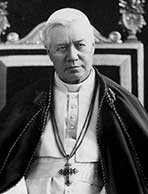
St. Pius X, daddy
Pope St. Pius X followed with concern and sorrow the events that led to the outbreak of the conflict. "I bless peace, not war."he exclaimed when the Emperor of Austria begged him to bless his armies. It filled him with bitterness to see Catholic nations facing each other to the death. Overwhelmed by the tragic consequences he foresaw, he died on August 21.
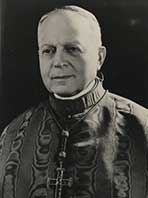
Federico Tedeschini, cardinal
A team coordinated with the Red Cross operated in Rome and Switzerland under the orders of the then Monsignor Federico Tedeschini. By the end of the war, 600,000 requests for information and 40,000 requests for the repatriation of prisoners had been processed, those unfit for combat had been released and 29,000 were allowed to convalesce in Swiss hospitals.
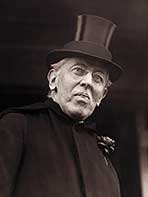
Thomas Woodrow WilsonPresident of the United States
Benedict XV influenced the negotiators of the 1919 Peace of Paris. There are obvious similarities between Benedict XV's proposals and the famous 14 Points that U.S. President Wilson presented in Paris to inspire the construction of the new international order.
Diplomat, former Spanish ambassador to Ethiopia and Slovenia, and author of the recent monograph "Benedict XV. A pontificate marked by the Great War."


